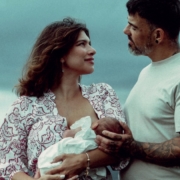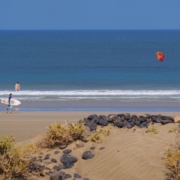What is it like to have a baby on Lanzarote? We spoke to a new mum to find out.
Photo: Lanzarote Photography
Just after midnight on April 15th the population of Lanzarote increased by one when Jessica Schuimer gave birth to her daughter Abigail at the maternity unit in Lanzarote’s Dr José Molina Orosa Hospital. Abigail is just one of over a thousand babies that come into the world each year on Lanzarote, and Jessica was one of hundreds of women who start motherhood. We decided to ask her about the experience.
If you enter a Spanish maternity ward you are in safe hands. Spain is one of the safest countries in the world for mothers to give birth and for babies to be delivered, with lower infant and maternal mortality rates than the UK, Germany and France.
However, there have occasionally been complaints that this efficiency can be impersonal and almost mechanical. In Spain, birth is seen as a medical procedure. There is little support for alternative birthing experiences and home births are generally discouraged.
This technical approach was one of things that Jessica feared having had an unpleasant experience when suffering a miscarriage at the hospital a few years ago. “I found the experience in the hospital very upsetting. Staff were handling me, putting their hands on me without asking and not explaining what was going on to me. I was really worried that something similar would happen again.”
It did not, however. “I had a good pregnancy,” says Jessica. “I didn’t suffer from nausea or morning sickness and I was working for two months before the birth. I do two jobs, though, and in the end that became too much.”
She believes that activity and exercise helped with the smooth pregnancy. “It’s hard when you feel tired and the easiest thing to do is just to lie down, but the general feeling is so much better if you do make the effort. Also, we have a dog to walk, so there’s no excuse!”
Like all expecting mums, Jessica was assigned a midwife who saw her regularly once a month, and more frequently as the due date approached. She also had three standard ultrasound scans at the hospital. “These are to check the baby’s development, but they’ll email you the image, too. We also chose to have a private test done each trimester at Hospiten” says Jessica.
In the run-up to the big day, Jessica attended a three-day course at the IFAL clinic in Arrecife and also took twice-weekly classes in Arrecife to prepare her for the birth, and these included pre-natal exercises which she continued at home. “I think the fact that I was in good physical shape helped me have a fairly fast labour,” she says “I was having contractions during the day on Monday, then my waters broke at around 6 pm. I was admitted to the maternity unit and gave birth just after midnight. It was quick but it was also very intense.”
Information was one thing Jessica found useful: “After my previous bad experience, I wanted to be more of a part of the process,” she said “Things were much better this time; the midwife gave me a clear view of what was going to happen and the attention was good. That’s why I’d recommend anyone who’s planning to give birth here to ask questions and find out exactly what’s happening. They probably won’t tell you unless you ask them”.
Jessica ‘s approach to going into labour was fairly casual. “One advantage of living on Lanzarote is that the hospital isn’t far away. I had an emergency bag prepared during the later stages of pregnancy but I wasn’t that worried about it because I knew that my partner could nip back home in a just a few minutes for clothes or any other items.”
Jessica had wanted a drug-free birth, and had been attracted by the idea of giving birth in a squatting or standing position, but it didn’t work out like that. “I had this idea that I wanted to feel everything,” she says, “But it turned out to be difficult.”
Pain relief options such as gas and air and TENS machines are not usually available in Spain, where the most common form of pain relief is the epidural. And that is what Jessica finally opted for when the pain became too much for her. “Another piece of advice that I think is very important is to remember that, whatever you imagine or envision, it is probably not going to go as you planned, so don’t feel too bad about it.”
After labour, Jessica was kept in the hospital for observation for another day and even though she was a little small at 2.8 kilogrammes and 46 cms, Abigail was allowed to remain with her, rather than whisked off to an incubator. While she rested, her partner carried out the paperwork that is necessary for registering a child.
A month after the birth, mum and baby are both doing fine. Jessica still gets calls of “Guapa!” as she pushes her pram down the street, but the real gasps of admiration come when people peer at the tiny, beautiful little girl within.
Do you have any opinions on giving birth on Lanzarote? Share your experiences with us at editorial@gazettelife.com











Leave a Reply
Want to join the discussion?Feel free to contribute!